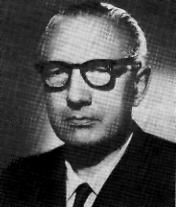I returned, and saw under the sun,
that the race is not to the swift, nor the battle to the strong, neither yet
bread to the wise, nor yet riches to men of understanding, nor yet favour to
men of skill; but time and chance happeneth to them all.
Ecclesiastes
9:11
Bourbaki’s theorem: a hoax math lecture
A couple years ago I wrote about the experiment where researchers had hired an actor to lecture in place of a great scientist. They introduced him as Dr. Myron Fox, an authority on the application of mathematics to human behavior. The Ph.D. psychologists who attended the lecture did not suspect anything wrong and were fully satisfied with Dr. Fox’s answers to their questions.
During the discussion of my article people argued that Dr. Fox was not exposed only because he spoke of mathematics and the audience consisted of psychologists. However, I found out that the same thing had happened with mathematicians. The hoax took place at the prestigious Ecole normale superieure (ENS) in Paris. The most comprehensive readily available account is in Andre Weil’s autobiography [1]. He writes that while he studied at ENS
… the newly matriculated scientific class of 1923 received notification on the administration's official letterhead that a professor with a vaguely Scandinavian name would be giving a lecture on such-and-such a day, at such-and-such a time, and attendance was strongly recommended. The speaker was Raoul Husson, a more advanced student and a gentle prankster who later pursued a career as a statistician before finding his way to phonology and the scientific study of singing, to which he is said to have made some valuable contributions. In 1923, he appeared before the new "conscripts" armed with a false beard and an indefinable accent, and presented a talk which, taking off from a modicum of classical function theory, rose by imperceptible degrees to the most extravagant heights, ending with a "Bourbaki's theorem" which left the audience speechless with amazement. At least thus goes the legend, with the additional detail that one of the students who attended the lecture claimed to have understood everything from beginning to end.

Raoul Husson (1901-1967) |
Another book [2] gives one more detail: the Scandinavian name was Holmgren, but this is all one can learn from literature. So I decided to search for more facts. Unfortunately, two Husson obituaries [3], [4] do not mention any children, so he probably had none. So I started to search for children of lecture attendees. Prof. Jean Pradines, an ENS graduate himself, was good enough to send me the list of 21 people admitted to ENS in 1923.
I found Rene Coulomb, the son of one of lecture attendees, Jean Coulomb. He wrote to me that his father said to his elder brother Pierre Coulomb the following:
Nobody had got anything out of this lecture save Rene de Possel who believed he had understood some ideas (but not the entire lecture contrary to what Andre Weil asserts).
|
So now we know who “understood” the nonsensical lecture. Remarkably, this is not a marginal crank, but a respected mathematician, who has a Wikipedia article about him. De Possel was one of the members of the famous group of mathematicians, which published under collective pen name Bourbaki. This pen name was inspired by Husson’s lecture.
I am grateful to Todor Mishonov, for telling me about this remarkable lecture, to Philippe Elbaz-Vincent and Michel Zisman for bringing Refs 1 and 2 to my attention, and to Jean Pradines for sending a copy of Ref. 4.
Mikhail Simkin
September 23, 2013
This article appeared in Significance, a magazine of The Royal Statistical Society.
Literature
- Andre Weil, “The Apprenticeship of a Mathematician” (Springer, 1992).
- Maurice Mashaal “Bourbaki: A Secret Society of Mathematicians” (American Mathematical Society, 2006)
- G. Portmann, “Raoul-Nicolas Husson,” Rev Laryngol Otol Rhinol (Bord). Vol. 89 (1968) pp. 242-4.
- A. Kastler, “Husson,” Annuaire des anciens eleves de l'ENS (1970) pp. 49-51. I am grateful to Jean Pradines for supplying this article.
 Feedback
Feedback
 Discuss
Discuss
 RSS
RSS
 Newsletter
Newsletter
